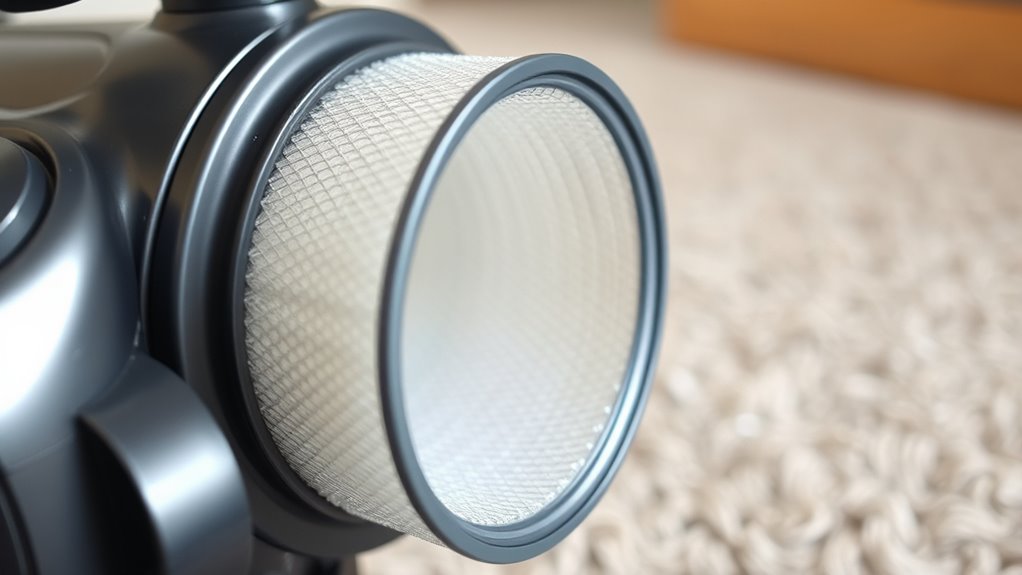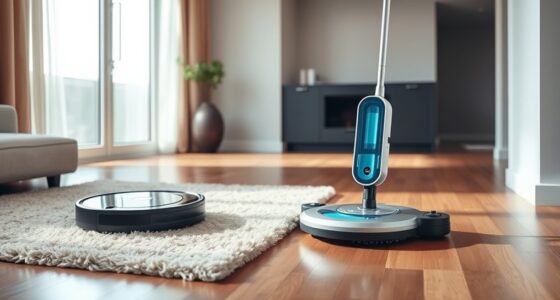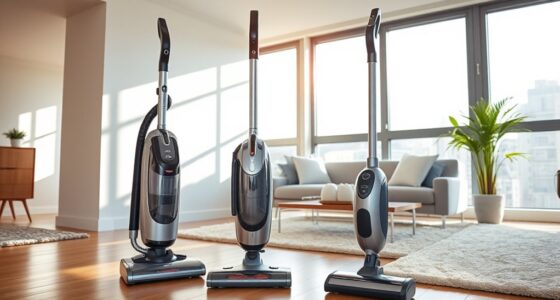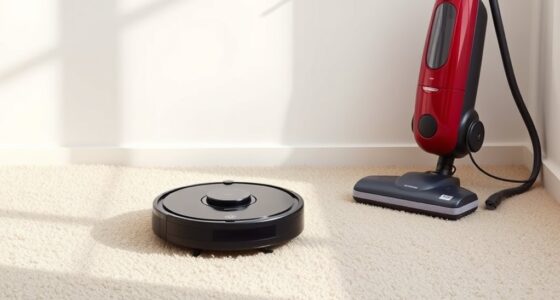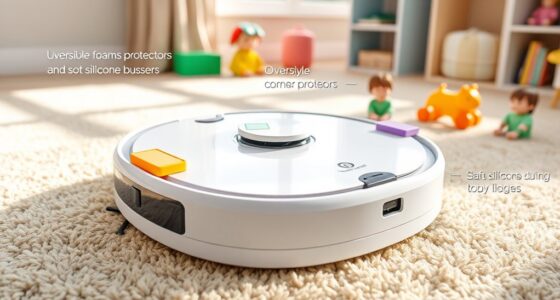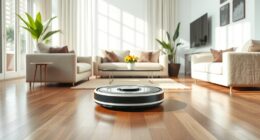If you’re considering a vacuum with a HEPA filter, it’s worth it. HEPA filters trap 99.97% of tiny particles like dust, pet dander, pollen, and mold spores, which can improve your indoor air quality and reduce allergy symptoms. They’re especially helpful if you have asthma or allergies. Plus, they keep your vacuum performing efficiently over time. Stick around to find out how these filters can make a real difference in your home environment.
Key Takeaways
- HEPA filters trap 99.97% of tiny particles, improving indoor air quality and reducing allergens effectively.
- They are especially beneficial for allergy and asthma sufferers by capturing dust, pet dander, and pollen.
- HEPA-equipped vacuums maintain consistent cleaning performance and reduce airborne irritants over time.
- Combining HEPA filters with regular vacuuming enhances overall indoor air purification and allergen control.
- Investing in HEPA filters is worthwhile for healthier, cleaner living spaces, especially for sensitive individuals.
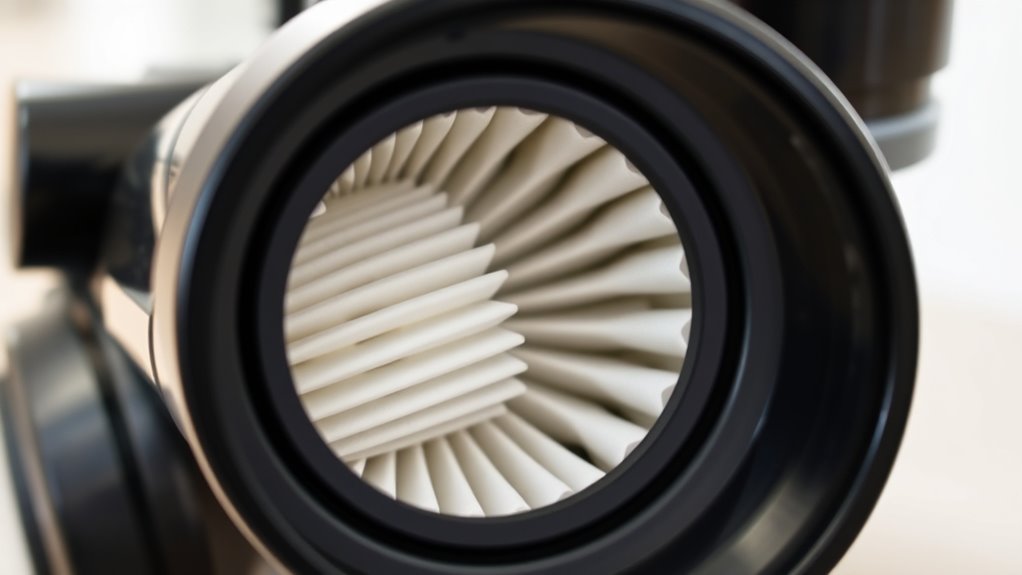
HEPA filters in vacuums are essential tools for improving indoor air quality, especially if you suffer from allergies or asthma. These filters are designed to trap microscopic particles that standard vacuum filters often miss, making them a critical component in air purification efforts within your home. When you use a vacuum equipped with a HEPA filter, you’re actively reducing airborne irritants like dust mites, pet dander, pollen, and mold spores—common triggers that can worsen allergy symptoms. This enhanced filtration process means that not only is your home cleaner on surfaces, but the air you breathe becomes considerably purer, supporting your overall respiratory health.
HEPA vacuum filters trap microscopic allergens, improving air quality and supporting respiratory health in allergy-prone homes.
If you’re seeking allergy relief, HEPA filters are worth considering because they target the tiny particles that typically evade regular filtration systems. Unlike standard filters, HEPA filters capture at least 99.97% of particles as small as 0.3 microns, which includes many allergens that can cause sneezing, congestion, or asthma flare-ups. By using a vacuum with a HEPA filter regularly, you’re actively removing these allergens from your environment, reducing their presence in the air and on surfaces alike. This means less irritation and discomfort for you, especially during peak allergy seasons or if you have sensitivities to pet dander or dust.
Incorporating a vacuum with a HEPA filter into your cleaning routine also simplifies your efforts at air purification. You won’t need to rely solely on air purifiers; your vacuum becomes part of an all-encompassing approach to cleaner indoor air. The effectiveness of HEPA filters in trapping allergens helps you maintain a healthier living space without constantly battling airborne irritants. Plus, because these filters are designed to be highly efficient, you’ll find that your vacuum’s performance remains consistent over time, providing continuous allergy relief without needing frequent filter replacements.
Additionally, the integration of robotic automation in cleaning routines can further enhance overall air quality by ensuring consistent and thorough vacuuming, especially in hard-to-reach areas. Ultimately, investing in a vacuum with a HEPA filter can make a noticeable difference if allergies or asthma are concerns for you. It’s a straightforward way to improve your indoor air quality, making your environment more comfortable and healthier. The combination of better air purification and allergy relief makes these vacuums a smart choice for anyone looking to breathe easier and live more comfortably at home. With consistent use, you’ll notice fewer allergy symptoms and a cleaner, fresher home atmosphere—proof that HEPA filters are well worth the investment.
Frequently Asked Questions
Do HEPA Filters Require Frequent Replacement or Cleaning?
You might wonder if HEPA filters need frequent replacement or cleaning. Their filter lifespan varies based on usage, but generally, you should check and clean them every few months. Regular cleaning reduces dust buildup, extending their effectiveness. If you notice decreased suction or musty odors, it’s time to replace the filter. Proper maintenance ensures ideal vacuum performance and better air quality, making it worth paying attention to your HEPA filter’s cleaning frequency.
Are HEPA Filters Effective Against All Types of Allergens?
You might wonder if HEPA filters effectively remove all airborne allergens. They are highly efficient at trapping common allergens like dust mites, pet dander, and pollen, but they may not catch everything, especially very tiny particles or gases. The filter’s lifespan influences performance; replacing it when clogged guarantees continued allergen removal. Regular maintenance maximizes its effectiveness, helping you breathe cleaner air and reduce allergy symptoms.
Can HEPA Filters Improve Indoor Air Quality Significantly?
Think of HEPA filters as your home’s silent guardians, quietly battling airborne foes. Yes, they can greatly improve indoor air quality, acting like a breath of fresh mountain air amid city smog. By trapping tiny particles, they enhance air purification and offer allergy relief. Installing a vacuum with a HEPA filter turns your space into a sanctuary, helping you breathe easier and enjoy cleaner, healthier air every day.
Are HEPA Filters Compatible With All Vacuum Models?
You’ll find that HEPA filters aren’t compatible with all vacuum models, so it’s important to check vacuum compatibility before purchasing. Some vacuums are designed for easy filter installation, making it simple to upgrade. However, others may require adapters or modifications. Always verify your vacuum’s specifications and guarantee the filter fits properly to maximize air quality benefits. Proper filter installation is key to maintaining your vacuum’s performance and air cleanliness.
What Is the Cost Difference Between HEPA and Non-Hepa Filters?
You’ll find that HEPA filters cost more than non-HEPA filters due to their advanced filter material and higher filter lifespan. Typically, non-HEPA filters are cheaper upfront, but they may need replacing more often, which can add up. HEPA filters, while initially pricier, last longer and trap smaller particles more effectively. So, consider your budget and cleaning needs to decide if the extra cost is worth it for better air quality.
Conclusion
So, while HEPA filters might seem like a small upgrade, they can make a big difference if you struggle with allergies or asthma. Think of them as your home’s silent shield—protecting you from tiny, invisible irritants. Without them, you might breathe easier now, but long-term, those allergens could build up. Investing in a HEPA filter isn’t just about cleaner floors; it’s about creating a healthier space where you can truly breathe freely.
